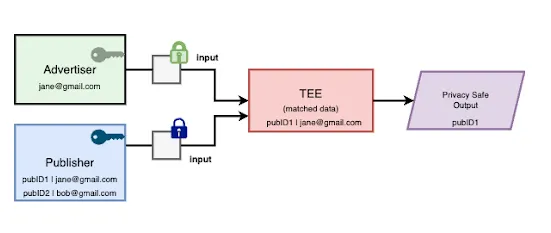As Google continues to investigate more privacy-aligned solutions to limit personal data collection, while still enabling optimal ad targeting, it’s rolling out a new process called “confidential matching” for Google Ads, which will provide a new way to combine Google’s insights with a businesses’ first-party info in order to reach the right audiences.


As you can see in this overview, confidential matching uses Trusted Execution Environments (TEEs) to combine data inputs, then facilitate ad targeting based on this amalgamated output. Similar to data clean rooms, the process essentially encrypts the two data sets, ensuring that no personal data is shared, while still enabling custom ad targeting.
As per Google:
“TEE’s isolate processing such that even those with administrative privileges to the main system cannot directly access or manipulate the TEE’s contents. This safeguards against both external attacks and misuse by privileged users.”
That could provide a more business-friendly solution to data sharing and usage concerns, which Google has been working towards over the past few years.
With limited success. For example, Google had been set to phase out cookie tracking in Chrome by 2022, but various industry and regulatory challenges forced it to repeatedly push back that deadline, in order to accommodate for all parties. Then in July this year, Google announced that it was shelving its cookie roll-out plan entirely, in favor of more suitable systems that would better align with the various elements.
TEE and confidential matching will play a part in this, with Google likely to implement various updates and changes, as opposed to a larger, blanket switch in one key aspect.


And it seems confident that confidential matching will be a viable solution:
“Confidential matching is now the default for any data connections made for Customer Match including Google Ads Data Manager — with no action required from you. For advertisers with very strict data policies, it also means the ability to encrypt the data yourself before it ever leaves your servers.”
It’s another step towards enhanced data privacy, which should also continue to facilitate more in-depth audience targeting through Google’s tools.
And while the technical details are likely beyond most marketers, who are simply looking to run ads, it does at least appear to address several key concerns with current data usage processes.















